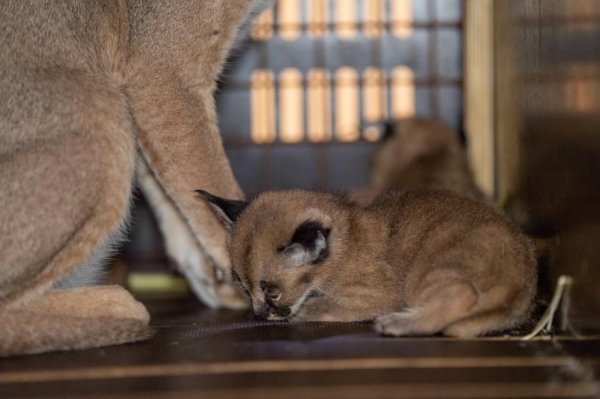The National Center for Wildlife (NCW) recently announced the successful birth of two caracal cubs at the Prince Saud Al-Faisal Wildlife Research Center in Taif. This achievement is part of the center’s breeding program, which started in 2022 with a nucleus of 16 individuals. The main goal of this program is to conserve and protect wildlife, maintain ecosystem balance, and enrich biodiversity in alignment with the National Environmental Strategy and the Saudi Green Initiative. The NCW has invested significantly in upgrading and preparing the caracal enclosures at the research center, leading to notable improvements in breeding and care programs for this majestic species.
Dr. Mohammed Qurban, CEO of the National Center for Wildlife, expressed his delight at this milestone and highlighted the success of their efforts in rehabilitating ecosystems and enhancing balance. This achievement demonstrates the organization’s dedication to conserving endangered species and expanding breeding programs as part of their ambitious environmental initiatives aimed at protecting biodiversity in the Kingdom. The NCW is committed to supporting efforts to breed and reintroduce endangered species into their natural habitats through specialized scientific programs and activities in collaboration with local and global experts.
As part of their efforts, the NCW has launched breeding and reintroduction programs for local predators, including the lynx, while also expanding protected areas to ensure suitable habitats for these creatures. Predators play a crucial role in maintaining ecological balance by contributing to food chains and ecosystem integrity. Established in 1986, the Prince Saud Al-Faisal Wildlife Research Center in Taif focuses on breeding and reintroducing local endangered species into their natural habitats and monitoring their post-release progress. The center hosts eight breeding programs for various species, including the Asina Houbara, Arabian oryx, Common Ostrich, Arabian leopard, Arabian Mountain gazelle, Nubian ibex, Caracal, and Arabian hare.
This successful breeding program is a testament to the NCW’s dedication to wildlife conservation and preservation of biodiversity in Saudi Arabia. The center’s efforts to breed and reintroduce endangered species into their natural habitats are crucial for maintaining ecosystem balance and protecting the Kingdom’s rich biodiversity. By collaborating with local and global experts, the NCW is able to implement specialized scientific programs aimed at ensuring the survival and flourishing of these majestic species, such as the caracal cubs recently born at the research center in Taif.
The birth of the two caracal cubs at the Prince Saud Al-Faisal Wildlife Research Center in Taif represents a significant milestone in the NCW’s breeding program and underscores the success of their efforts in rehabilitating ecosystems and enhancing balance in the region. Through their commitment to conserving endangered species and expanding breeding programs, the NCW is making a positive impact on biodiversity conservation in Saudi Arabia. As the organization continues to implement ambitious environmental initiatives aimed at protecting wildlife and ecosystems, their dedication to supporting efforts to breed and reintroduce endangered species into their natural habitats is essential for the long-term sustainability of these species and the ecosystems they inhabit.
In conclusion, the National Center for Wildlife’s successful breeding program for caracal cubs at the Prince Saud Al-Faisal Wildlife Research Center in Taif is a significant achievement that highlights the organization’s commitment to wildlife conservation and biodiversity protection in Saudi Arabia. Through their efforts in breeding and reintroducing endangered species into their natural habitats, the NCW is playing a crucial role in maintaining ecosystem balance and enriching biodiversity in the Kingdom. By partnering with local and global experts and investing in specialized scientific programs, the NCW is ensuring the survival and flourishing of majestic species like the caracal, contributing to a more sustainable future for wildlife in Saudi Arabia.











